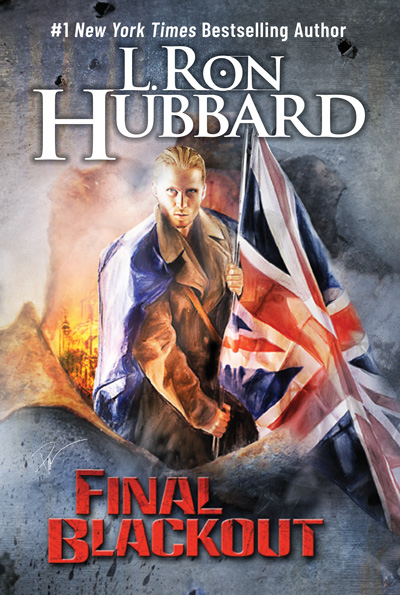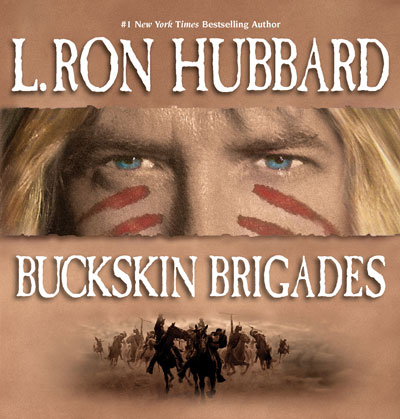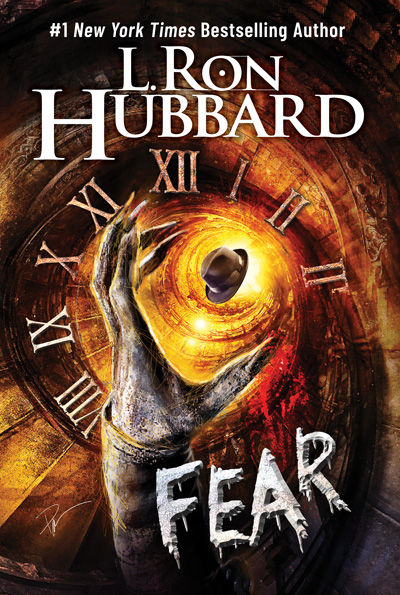A novel of compelling suspense.
Professor James Lowry didn’t believe in spirits, or witches, or demons.
Not until a gentle spring evening when his hat disappeared, and suddenly he couldn’t remember the last four hours of his life. Now, the quiet university town of Atworthy is changing—slightly at first, then faster and more frighteningly each time he tries to remember.
Lowry is pursued by a dark, secret evil that is turning his whole world against him while it whispers a warning from the shadows: If you find your hat you’ll find your four hours. If you find your four hours then you will die.…
Narrated by Roddy McDowall.
“A classic tale of creeping, surreal menace and horror … one of the really, really good ones.” —Stephen King
ABOUT THE AUTHOR
L. Ron Hubbard began work on Fear in January 1940. His customary practice was to visualize a story completely and then to sit down and write it, straight through, with whirlwind speed. But by his own account, Fear came more slowly. “I finally got the plot of it licked,” he wrote to a friend, describing his realized conception of the main character who unexpectedly loses hours from his life.
“He strives to locate his deeds while missing everywhere but in the right place, for he fears to look there,” the author explained. As for style, Ron Hubbard added: “And I think a nice, delicate style is best suited. Paint everything in sweetness and light and then begin to dampen it, not with the style, but with the events themselves.”
In the preceding issue of Unknown, John Campbell had warned his readers not to miss Hubbard’s story. “Fear,” he said, “has been built of nightmare stuff.”
It was. It is. And its impact was immediate, genre-shaping, and permanent. Literary historian David Hartwell has applauded it as “one of the foundations of the contemporary horror genre, widely influential, and powerfully effective. From Ray Bradbury to Stephen King, a literary debt is owed to L. Ron Hubbard for Fear.”
Fear Glossary
ague: a fever with alternating periods of chills and sweating.
Alas, poor Lowry. I knew him, Horatio: a reference to a line in the Shakespeare play, Hamlet. Hamlet says to his friend Horatio while holding the skull of Yorick, the dead court jester: “Alas, poor Yorick! I knew him, Horatio.”
auto-da-fé: an execution of a heretic by the Spanish Inquisition, especially by burning them at the stake. Auto-da-fé is Portuguese for “act of faith.”
bagatelle: something unimportant and easy to do.
box: the raised seat on a horse-drawn coach where the driver sits.
Brummell, Beau: an English gentleman (1778–1840) who had a reputation for fashion, wit and was a regular attendee at social gatherings.
buccaneer: a pirate, especially one who fought and preyed on Spanish ships in the West Indies during the seventeenth century. The word buccaneer comes from the French word boucanier, a French trader on the islands of Hispaniola and Tortuga who hunted the island’s wild cattle and boars for their hides, smoking the meat in a barbecue frame known in French as a boucan. Conflict with Spanish forces drove them off the islands and forced them into piracy against the Spanish.
cabalistic: about secret or mystical beliefs.
Carroll: Lewis Carroll (1832–1898), an English author whose most famous writings are Alice’s Adventures in Wonderland and Through the Looking-Glass.
cashier: to dismiss someone from a position of command for disciplinary reasons.
Cicero: Marcus Tullius Cicero (106–43 BC), a Roman statesman, lawyer, political theorist and philosopher.
Colt .38: a .38 inch-caliber automatic pistol manufactured by the Colt Firearms Company of Hartford, Connecticut.
constable: a police officer of the lowest rank.
devil, to: to tease or make fun of someone.
don: a Spanish gentleman.
Drake: Sir Francis Drake (1540–1596), an English sea captain, slave trader, naval officer and explorer.
Dumas: Alexandre Dumas (1802–1870), a French writer best known for his swashbuckling historical tales including The Count of Monte Cristo and The Three Musketeers.
ennui: weariness resulting from inactivity or lack of interest; boredom.
Erin: an ancient name for Ireland.
Fates: in classical mythology, the three goddesses Clotho, Lachesis and Atropos, who control the destiny of humans.
flagship: a ship where the commander of the fleet lives.
Gibbon: Edward Gibbon (1737–1794), an English historian best known for his work The History of the Decline and Fall of the Roman Empire.
Greenwich Village: a residential section of lower Manhattan, New York City. It is famous as a gathering place for writers and artists.
heard tell: was told that.
Homer: (eighth century BC), a Greek epic poet who is believed to be the author of two of the greatest works in Western literature, The Iliad and The Odyssey.
Horatio: See Alas, poor Lowry. I knew him, Horatio.
Ingraham, Colonel: Colonel Prentiss Ingraham (1843–1904), a prolific American fiction author, best known for his Buffalo Bill series.
Ketch, Jack: an English executioner in the 1600s, notorious for the barbarous and sadistic techniques he employed. His victims were known to have suffered unnecessarily at their deaths due to his brutal and inept manner.
Khayyám: Omar Khayyám (1048–1131), Persian mathematician, astronomer and poet. His most well-known poetry is the collection translated by English writer Edward FitzGerald entitled The Rubáiyát of Omar Khayyám.
lord high admiral: the commander of a naval fleet.
Machiavellian: cunning, deceitful and dishonest. The word Machiavellian comes from the name of the Renaissance diplomat and writer Niccolò Machiavelli (1469–1527) who described how to acquire and maintain political power in his work, The Prince.
Medusa: in Greek mythology, a monster with the face of a hideous woman with live venomous snakes for hair. Anyone who looked at her directly turned to stone.
merchant prince: a very wealthy or influential merchant.
mother: used to address an elderly woman with affectionate respect.
New World: North America, Central America and South America; the Americas.
old top: used to address a male friend or acquaintance.
old wives’ tale: a superstitious belief or legend not based on fact.
Parisian wit: a sense of humor that always finds something to laugh about, no matter how tragic a circumstance may be.
pince-nez: a pair of glasses held on the face by a spring that pinches the nose. Pince-nez is French for “pinch the nose.”
ride to hounds: to ride behind the hounds in a fox hunt.
rondure: a rounded or curved part of something.
Shakespeare: William Shakespeare (1564–1616), English playwright and poet. His works include Hamlet, Romeo and Juliet, Othello and other plays and poetry.
shilly-shally: act in an uncertain or hesitant manner.
siphon: short for soda siphon, a glass bottle with a tube for dispensing soda water.
sola topi: a pith helmet, a sun hat made from the stems of a sola plant. Topi is Hindi for hat.
strain: part of a family that combines the characteristics of a certain line of ancestors.
sup: to eat or drink something.
Swift: Jonathan Swift (1667–1745), an Anglo-Irish satirist, essayist and poet, whose works include Gulliver’s Travels.
Tennyson: Alfred Tennyson (1809–1892), a British poet whose poems include “The Charge of the Light Brigade” and “The Lady of Shalott.”
throw dirt: be disrespectful toward someone or something.
Verne: Jules Verne (1828–1905), a French author who pioneered the science fiction genre writing novels such as A Journey to the Centre of the Earth and Twenty Thousand Leagues Under the Sea.
whatnot stand: a stand with shelves, used for displaying ornaments, etc.
Yucatán: a peninsula in southeastern Mexico between the Caribbean Sea and the Gulf of Mexico.










